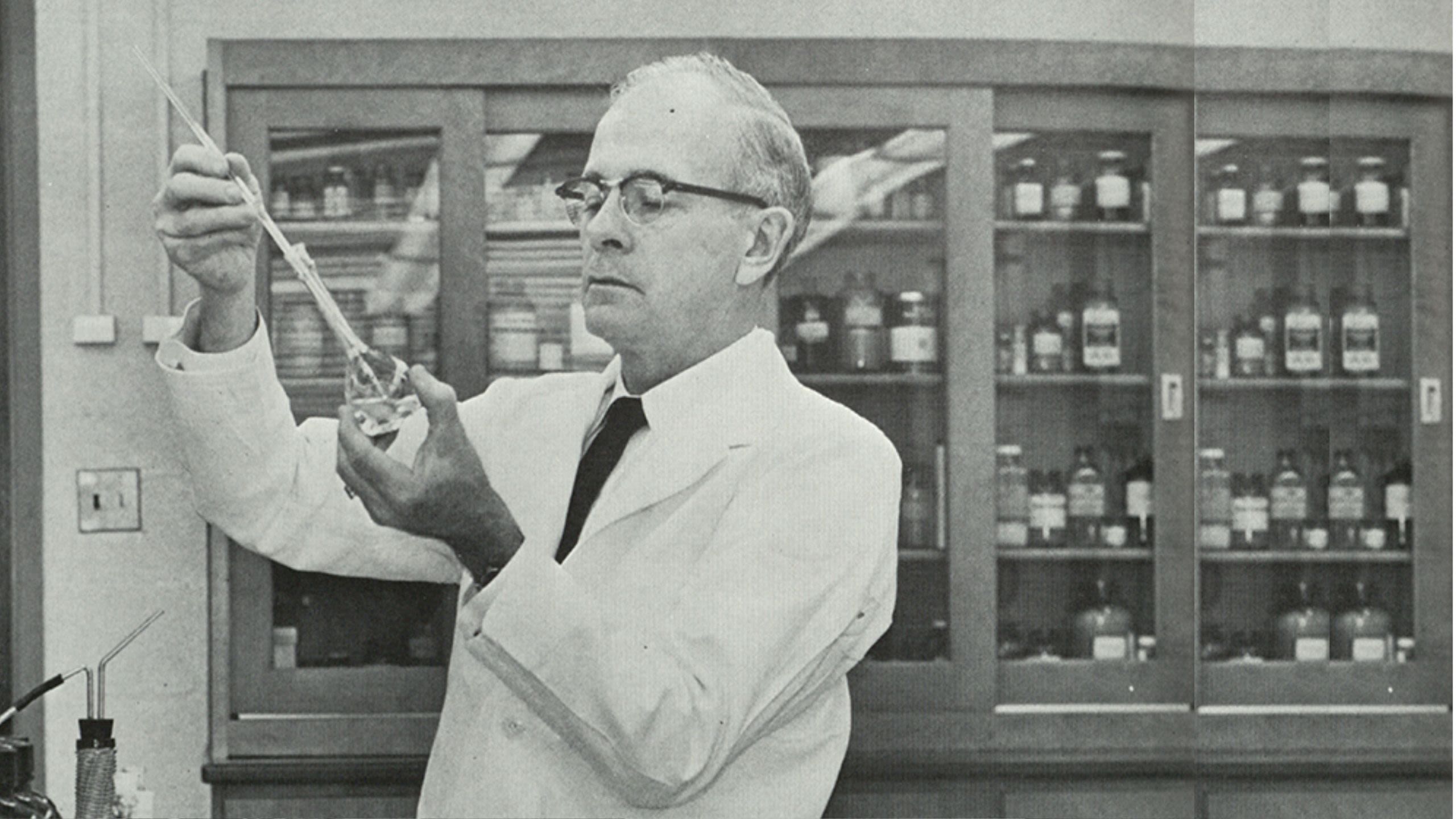A Health Care Powerhouse
For nearly a century, the University of Houston has been a leader in educating tomorrow's health care professionals.

Counting the ways health care education at UH impacts patient care in Houston, the state and the nation.
When it comes to excellence in health care education, the University of Houston is a standout. A full 15 of 16 colleges offer health-related programs, underscoring UH’s deep health care roots and promising future. Trained under a collaborative, integrated approach, students are equipped to work in teams across disciplines to tackle complex, multifaceted health problems that affect patients of all backgrounds and life circumstances. Let’s dive into the impact UH’s health care programs are making in Houston, across Texas and nationwide.
81
Unique degree programs in health-related fields
1 in 4
UH students enrolled in a health-related degree program
85%
UH grads in health-related fields work in Texas
3x
Nursing school enrollment growth in the past five years
1st
New medical school in Houston in 50 years
180
Clinical partnerships
From optometry and nursing to pharmacy and social work, for more than 75 years, University of Houston students have been developing practical and innovative health care skills to meet community needs. Here’s how UH health programs have evolved over the decades.
UH Heath Care Through the Years

UH Heath Care Through the Years

1946
College of Pharmacy
During World War II, pharmacists worked 60 to 70 hours per week, and the pressure only intensified with the transition to a peacetime economy. As Houston's economy expanded, demand for pharmacists surged, prompting a coordinated campaign by chain and independent pharmacists, hospitals, pharmaceutical wholesalers, and manufacturers. In response, the University of Houston established the College of Pharmacy on October 16, 1946.
The inaugural class of 144 students enrolled in 1947. Initially housed in modest facilities within the "Old Science Building," the college shared space with other science departments. Dr. Noel Ferguson became its first official dean in 1949, serving until 1973. Today, the college is recognized as one of the premier pharmacy programs in Texas, preparing pharmacists and researchers to meet the evolving needs of health care.
1951
College of Optometry
The University of Houston College of Optometry was approved in 1951 and opened the following year, marking a major milestone in optometric education in Texas. It was the first optometry school in the state and the tenth in the nation, established through the leadership of UH President W.W. Kemmerer and with strong support from the Texas Optometric Association.
Since 1976, the college has been housed in the J. Davis Armistead Building, a facility specifically designed for optometric education and research. The college offers a comprehensive Doctor of Optometry program and admits approximately 100 students each year.
Meeting Houston’s Needs
Construction of J. Davis Armistead building.
Construction of J. Davis Armistead building.
Throughout its history, the University of Houston’s health-based professional schools and colleges emerged in direct response to pressing community needs.
1967
Graduate College of Social Work
The Graduate College of Social Work was established to address the region’s critical need for professionally trained social workers. Launched with $150,000 in initial funding from the Texas State Legislature, the college opened with a founding faculty of seven and an inaugural class of 26 students.
Established during a time of significant social change, the college was designed to prepare graduates to serve culturally rich, urban communities through evidence-based practice, advocacy, and research. As the only public graduate social work program in Houston, it has played a vital role in developing the local social services workforce and advancing UH’s mission of public service and community engagement.
Health in Houston
Health care is a cornerstone of Houston's economy, with the Texas Medical Center and its member institutions playing a pivotal role. As the world's largest medical complex, TMC fosters innovation in life sciences and provides critical health services to millions, solidifying Houston's status as a global leader in health care and biomedical research.
1980
College of Pharmacy Joins TMC
The College of Pharmacy established a strong foothold in the Texas Medical Center, becoming a member in 1980. It opened a building in the TMC that same year. This affiliation allowed the college to expand research and clinical training opportunities and deepened its role in interdisciplinary collaboration.
President Khator's Impact
Under President Renu Khator's leadership, the University of Houston launched a transformative expansion of its health programs to address regional workforce demands. Aiming to enhance partnerships with Texas Medical Center institutions and fill existing gaps in health education and research, UH invested in new facilities, such as the Health & Biomedical Sciences Building, and recruited top-tier faculty to bolster its health sciences. These efforts positioned UH to better serve Houston and contribute significantly to the state's health care workforce.
2009
UH Joins TMC
The University of Houston was named a member institution of the prestigious Texas Medical Center in 2009, strengthening its presence in the world’s largest medical complex. In 2021, the Tilman J. Fertitta Family College of Medicine also became a TMC member, further integrating UH’s academic and clinical contributions into the region’s health care ecosystem.
2015
School of Nursing Transitions to UH
The School of Nursing officially became part of the UH campus in 2015, transitioning from its previous home at the University of Houston-Victoria. This move aligned the nursing program with UH’s growing portfolio of health-related disciplines and expanded opportunities for collaboration in the Texas Medical Center and Greater Houston region.
The transition strengthened UH’s commitment to addressing the state’s nursing shortage and improving health care outcomes by preparing highly skilled, practice-ready nurses.
2017
College of Nursing Designation
In 2017, the Texas Higher Education Coordinating Board reclassified the UH’s School of Nursing as the College of Nursing, marking a significant milestone in the program’s growth and recognition. This designation elevated the college’s status and opened new opportunities for advancement, including the ability to establish endowed scholarships, professorships and chairs. It also created naming opportunities that support long-term development and academic excellence.
2019
College of Medicine Established
UH established the College of Medicine — the first medical school founded in Houston in nearly 50 years — to address the growing shortage of primary care physicians in underserved communities across Texas. With a mission rooted in improving health outcomes, the college was designed to train primary care doctors who are committed to practicing in high-need urban and rural areas. In 2020, the college welcomed its inaugural class of 30 students, marking a major step in UH’s expansion into medical education.
2022
Fertitta College, Population Health
The medical school was officially renamed the Tilman J. Fertitta Family College of Medicine in recognition of a transformational $50 million gift from the Fertitta family. This landmark contribution positioned the college for long-term impact in addressing physician shortages and advancing health care access.
UH also launched its Population Health initiative in 2022, a first-of-its-kind program designed to advance health equity in Houston, across Texas and beyond. This bold effort takes a holistic approach to health and well-being, addressing the social, economic, environmental and behavioral factors that shape community health outcomes.
2023
Gessner College of Nursing
The College of Nursing was renamed the Andy and Barbara Gessner College of Nursing in 2023 in recognition of a transformative $20 million gift from the Gessner family. The gift honors the legacy of Andy and Barbara Gessner’s mothers, both of whom were nurses, and reflects the family’s deep appreciation for the vital role nurses play in health care.
2023
UH Graduates its First Class of Physicians
UH celebrated a historic milestone as the inaugural class of the Tilman J. Fertitta Family College of Medicine graduated, marking the university’s first cohort of physicians. Twenty-two students, selected from over 1,700 applicants, completed a rigorous four-year program focused on primary care, health equity and serving underserved communities.





